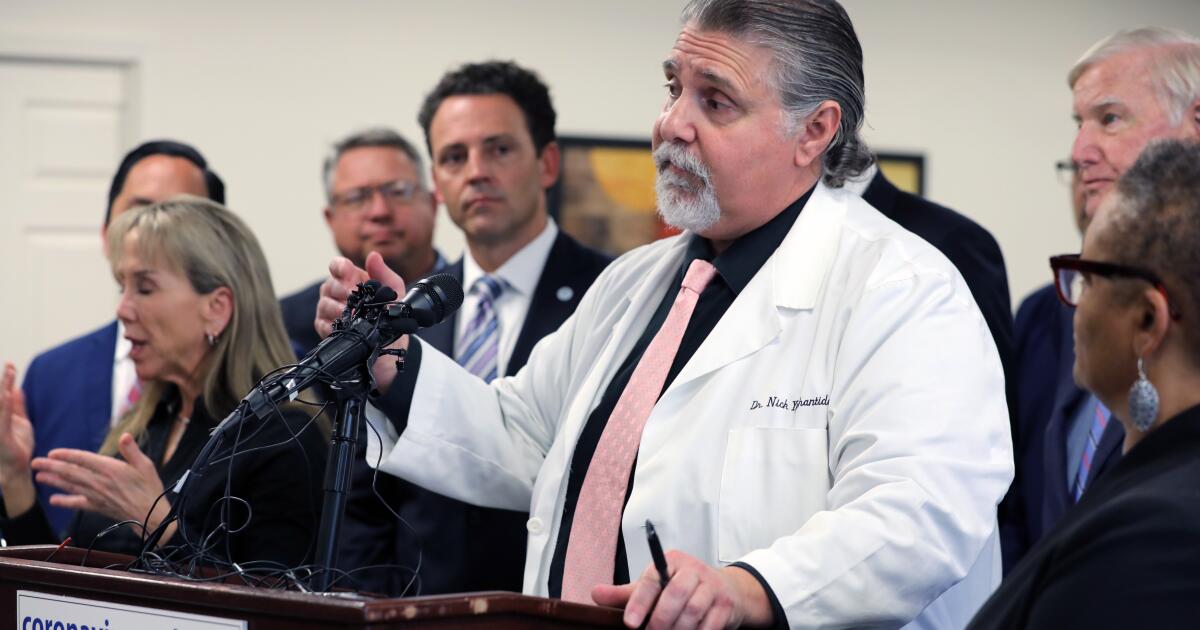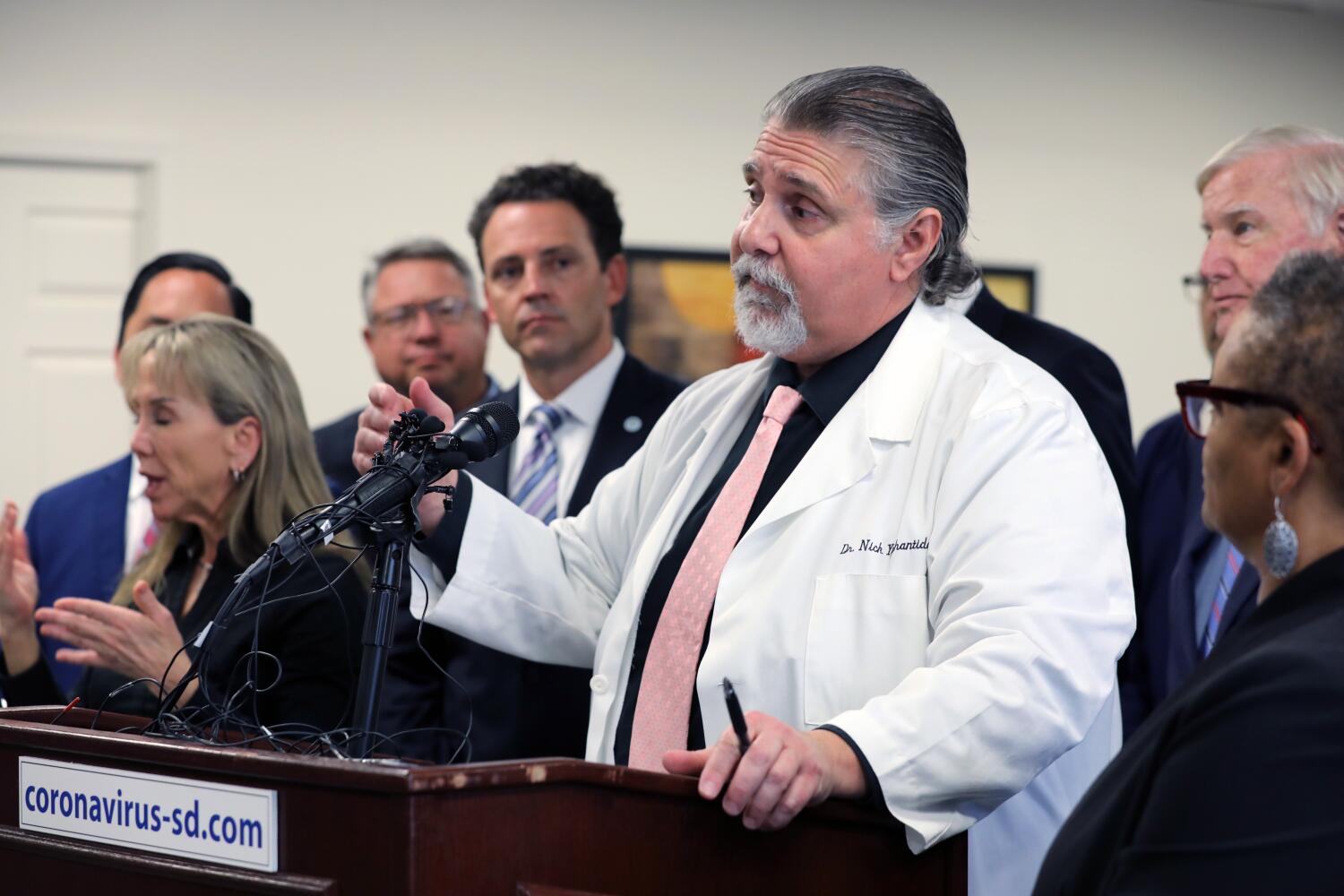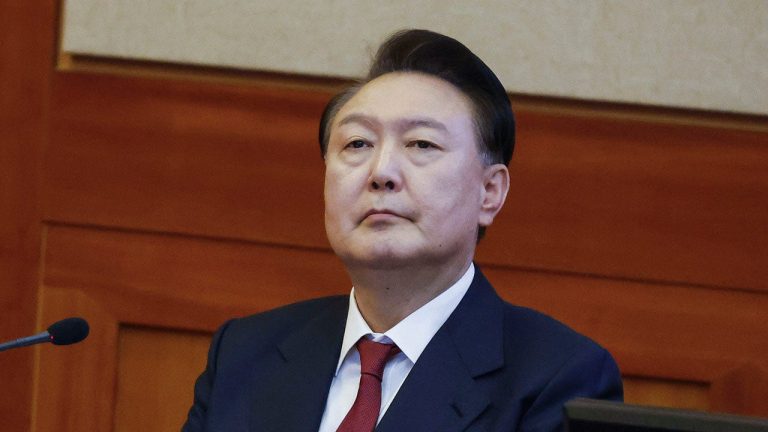

A federal jury has sided with San Diego County in the firing of former chief medical officer Dr. Nick Yphantides. While the doctor claimed the county wrongfully discriminated against him because of his bipolar disorder, the county claimed it fired him over inappropriate behavior.
After deliberating all day Friday following a seven-day trial, the jury found that the county did not discriminate against Yphantides or violate the state’s Fair Employment and Housing Act or other state laws by firing him in 2021.
“The decision to terminate Dr. Nick Yphantides was based on a careful consideration of the facts and our commitment to maintaining a workplace that is safe and free from inappropriate behavior,” Michael Workman, a county spokesperson, said in a statement. “We are pleased the jury agreed.”
Yphantides and his attorneys had argued that the county illegally fired him rather than provide the necessary accommodations so he could work while dealing with his disability. They said the symptoms of his bipolar disorder, which had long been dormant, were brought on by the stress and long hours related to his work helping lead the county’s response to the COVID-19 pandemic.
Attorneys for the county countered that Yphantides was not fired because of his bipolar disorder, but rather for behaving inappropriately. They said he pressured another county employee to arrange vaccines for a wealthy couple who was not yet eligible; sent inappropriate private messages to a subordinate county nurse; and sent sexually-charged messages to the mayor of San Marcos.
“The County takes its responsibility of protecting our employees and the public from improper conduct seriously,” Workman said Monday. “We have a zero tolerance policy for inappropriate conduct.”
Attorneys for Yphantides did not respond Monday to a request for comment on the verdict.
Yphantides, a 1992 graduate of UC San Diego medical school, had worked as a consultant for the county since 2009 and was hired full time as the county’s first chief medical officer in 2016. He was among the county health officials who announced a local state of emergency for COVID-19 on Feb. 14, 2020, weeks before the statewide announcement on March 4.
It was a declaration Yphantides pushed for based in part on both his professional and personal connections to disease outbreaks, one of his attorneys told the jury during opening statements. Not only does he have a master’s degree in public health, but he had helped lead the county’s response to the 2009 swine flu pandemic, which claimed the life of his father.
Yphantides had a high profile in several other pandemic-related announcements in early 2020 and often joined in daily press briefings with county Public Health Officer Dr. Wilma Wooten and other county leaders.
But an attorney for the county told the jury during opening statements that his public appearances came to a halt by the end of March 2020 because the county’s chief administrative officer began receiving complaints about Yphantides speaking too long and quoting Bible verses during news conferences. Other complaints followed throughout the year.
In October 2020, Yphantides took medical leave. He returned to work in November of that year but took a second leave in mid-January. By early March 2021, he informed his superiors he was ready to return to work, but by that time, the county was investigating reports that he had pressured another county employee to get two friends, a hotelier and his wealth-manager wife, to the front of the vaccine line. The county soon learned about the alleged inappropriate messages to the nurse and the San Marcos mayor.
On Thursday, the same day arguments in the trial wrapped up, the county filed a 984-page motion asking U.S. District Judge Gonzalo Curiel to dismiss the case as a matter of law rather than let the jury decide the outcome. The county attorneys argued that Yphantides and his attorneys failed to provide sufficient evidence of several key claims. Curiel denied the motion.
But on late Friday afternoon, after deliberating the entire day, the jury returned its verdict. One of the key questions in the trial was whether the county knew that Yphantides had a mental disability that limited his ability to work. The jury found that, yes, the county did know, but that the mental disability did not allow Yphantides to perform his essential job duties, even with reasonable accommodations.
The jurors also found that the county did not fail in its legal requirement to participate in a good-faith, interactive process with Yphantides to determine whether reasonable accommodations could be made. Lastly, the jury found that the county did not refuse to return Yphantides to his same job when his medical leave ended.
Yphantides had sought damages to cover past and future lost wages and benefits, and past and future mental suffering.





